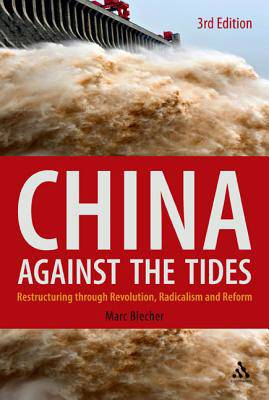
- Retrait gratuit dans votre magasin Club
- 7.000.000 titres dans notre catalogue
- Payer en toute sécurité
- Toujours un magasin près de chez vous
- Retrait gratuit dans votre magasin Club
- 7.000.0000 titres dans notre catalogue
- Payer en toute sécurité
- Toujours un magasin près de chez vous
China Against the Tides, 3rd Ed.
Restructuring Through Revolution, Radicalism and Reform
Marc BlecherDescription
China Against the Tides, 3rd Edition argues that, in both Mao and Deng periods, China evolved in ways quite different from the Soviet model and from other developing countries. Using an interdisciplinary and comparative approach, the book analyzes China by introducing theories and concepts from historical and political sociology, economic development, and political science. It also explores China from two comparative perspectives: developing countries (including the newly industrializing countries of East Asia) and historical state socialist regimes.
China Against the Tides, 3rd Edition seeks to combine both the internal perspectives of the actors themselves with the external standpoint of the social scientist. China is, of course, unique; but so are all countries. But, like other countries, its distinctiveness can best be grasped by observing it from outside as well as from within.
Every chapter in the third edition as well as the end bibliography has been updated. In addition, a new section examines China's international relations, and new coverage has been added throughout the chapters. For example, the third edition discusses: the Hu-Wen leadership that came to power in 2002, China's economic growth and social development, internet technology, the continued drumbeat of protests of various kinds, the situation in Tibet, the Olympic Games, the May 2008 earthquake, plus smaller but still notable events, such as the 2003 SARS outbreak, the Three Gorges Dam, and the 2005 pollution episode on the Songhua River
Spécifications
Parties prenantes
- Auteur(s) :
- Editeur:
Contenu
- Nombre de pages :
- 256
- Langue:
- Anglais
Caractéristiques
- EAN:
- 9780826427250
- Date de parution :
- 15-10-09
- Format:
- Livre relié
- Format numérique:
- Genaaid
- Dimensions :
- 158 mm x 235 mm
- Poids :
- 480 g

Les avis
Nous publions uniquement les avis qui respectent les conditions requises. Consultez nos conditions pour les avis.






